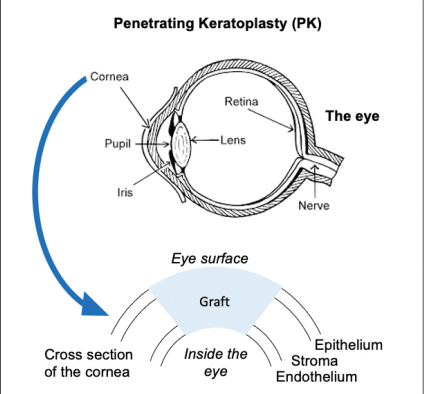Download and print as a PDF (340kB pdf)
On this page
The cornea is the clear window at the front of your eye. It acts like a clear lens through which light rays pass onto the back of the eye or the retina. To be able to see clearly, your cornea must remain transparent, healthy and in the correct shape.
Penetrating Keratoplasty, or PK replaces a diseased cornea with clear, healthy corneal tissue taken from a donor’s cornea. Only the central disc of the cornea is replaced, and stitches are used to hold it in place. It may take 12 to 18 months for your eye to heal completely after the procedure.

Why do I need this procedure?
You may need corneal grafting:
• To improve your vision if your cornea is scarred or irregular, for example, from Keratoconus or following infections.
• To treat acute and severe corneal infections or maintain the structural integrity of your eyeball in cases of perforation.
• For cosmetic reasons, to remove unsightly scars.
What are the possible complications of this procedure?
• Infection.
• Bleeding.
• Graft rejection.
• Astigmatism: irregularity of the cornea which may need glasses or contact lenses to correct.
• Cataracts.
• Glaucoma.
• Retinal complications, including retinal detachment or inflammation.
• Need for further procedures.
• Loss of sight (1 in 1000).
This operation is usually carried out under general anaesthesia. There can be risks associated with the anaesthesia used. For further information about the risks of anaesthetics, please see the booklet ‘You and your Anaesthetic’ or visit The Royal College of Anaesthetists website
Frequently asked questions
What happens now I am on the waiting list?
There will be other people on the list ahead of you, and you will have to wait for donor eye material to be available. This period can vary. When donor material has been arranged, you will be given a few weeks’ notice by post (and / or telephone) of your admission date, though sometimes this may be only days (in case of cancellation replacements).
How long will I be in the hospital?
Usually one day; however, it may be longer depending on the condition of your eye and how quickly it begins to heal up.
Will I be able to see it straight away?
Your vision will be blurred for a few days and gradually improve over weeks to months. This can fluctuate during the healing process until a few months after the stitches are removed.
With the new graft, the surface of your eye will likely change shape as part of the healing process. This is called astigmatism. You may require glasses or contact lenses to improve this.
When and how do I have the stitches removed?
The stitches will stay in for at least one year, though this will vary depending on your eye’s healing rate. When it is necessary to remove the stitches, this may be performed either in the
outpatient clinic or theatre. The procedure is done as a day case, usually under local anaesthetic, though you can discuss this more with your doctor.
Will I have to use eye drops after the operation?
Yes. You will be given steroid drops to help prevent graft rejection. When you are discharged from the ward, these will be given to you, and instructions will be explained to you by the nursing staff. Initially, you will have to use these drops every few hours and then gradually reduce in frequency over months.
Long term, you will be advised to continue drops (once or twice a day) for at least one to two years and may be longer, depending on your clinical situation. You will have regular follow-up appointments in the outpatient clinic after the surgery, and your doctor will advise when to stop your drops.
When can I resume normal activities?
• Work: You are likely to need one week, or longer, off work, depending on the type of job you have.
• Sport / hobbies: We advise waiting for four weeks before returning to sports or active hobbies.
• Flying: Air travel is usually permissible any time after the surgery.
What if I have any problems or worries?
If your eye becomes sore, red, or light-sensitive, or the vision becomes blurred after the operation, it is important to contact the hospital immediately. This could require urgent treatment.
Contact details
If you have problems or need urgent advice, ring the eye hospital. Ask for the Accident and Emergency Department (A&E) or Nursing Staff. There is always someone on duty, night and day.
Sussex Eye Hospital
Eastern Road
Brighton BN2 5BF
Out of Hours telephone
01273 664881
Compiled by: Ms Ritika Mukhija, MBBS, MD, FRCOphth, Dr Gabriella Quiney, MBBS and
Mr Mayank A. Nanavaty, MBBS, DO, FRCOphth, PhD.
This leaflet is intended for patients receiving care in Brighton and Hove or Haywards Heath.
The information in this leaflet is for guidance purposes only and is in no way intended to replace professional clinical advice by a qualified practitioner.